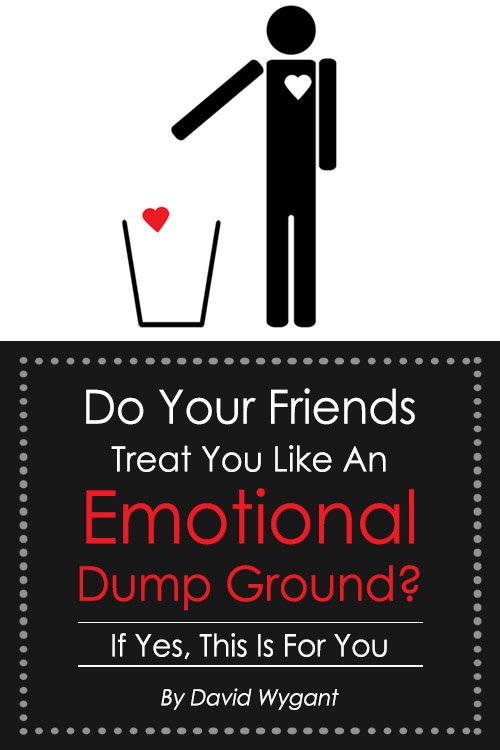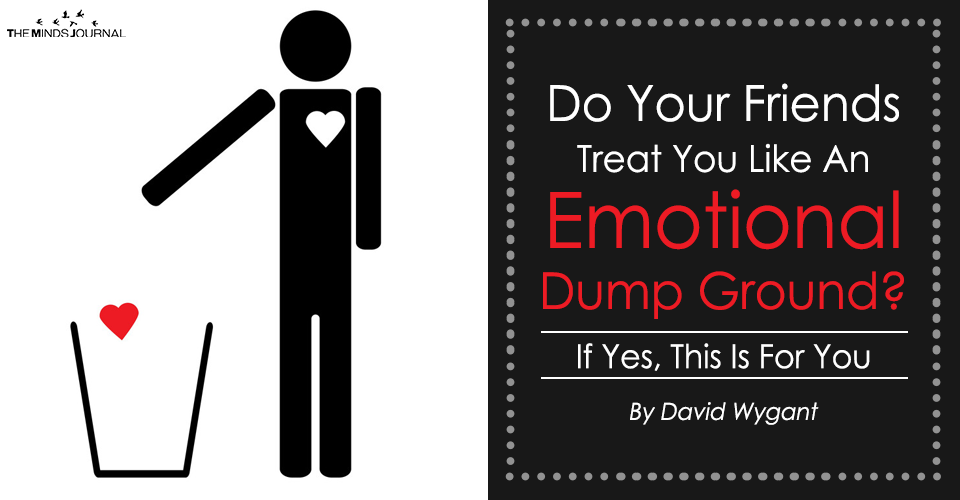Do you have any friends that think you’re an emotional dump ground? You call them on the phone just to shoot the shit. Do they even consider your emotions?
And they just feel the need to let it all out, to dump all of their unnecessary bullshit emotions on you.
You can handle it, they think. So they end up spending an entire 20 minute phone call with you emotionally dumping their life. Oh, they’ll tell you one victim story after the next.
They’ll even include you in part of it.
Maybe you got involved with them in a deal years ago and it didn’t work out, and they’ll bring it back up again just to make sure that you still know that they’re holding a grudge. Most often this happens covertly, and some, “friends” are so good at it, you don’t realize what happened until after the call is over and you feel completely drained.
Welcome to the world of having your emotions dumped on.
The problem is, and this is something that I have said and I have coached and told people over and over again. When a friend calls you, or your ex-wife calls you, your ex-husband calls you, your ex-girlfriend calls you, your brother calls you, your mother calls you, your father calls you, and they tell you about their life and their problems, you’ve got compassion for them, absolutely.
My compassion extends to everybody who’s made wrong decisions, wrong choices in life, and their life is a mess. I have lots of compassionate empathy for them.
And it’s also not my problem. It’s not my problem. It’s not my problem that an individual made the wrong choices. It’s not my problem that someone’s in a financial pickle.
It’s not my problem that someone’s in a bad marriage. Those are choices that that person took. Now, I can be a friend and I can listen and I can have empathy, but you can’t bail people out. You can’t hand them a blank check, you can’t let them take your emotions. And most importantly, you can’t be their emotional dumping ground.
We all make choices in our lives. That’s the thing about a choice, there’s no guarantee how that choice is going to work out.
Everyone has to live with their choice. Some of their choices will not work out, and they’re on public display. What happens when their choices don’t work out, they get fired, they’re no longer the GM of the team, and the team is looking to go another direction. The newspapers absolutely crucify them, the ESPN calls them the dumbest manager of the year, and they take the organization down.
But they made a choice. And in life, every choice you make is not going to work out the way that you expect it.
If you decided to try to build a business that didn’t work, that was your choice.
If you decided to live off an inheritance and think it would never end, and it did, that was your choice not to prepare for the future. If you chose to parent a certain way and your kids come back and bite you in the ass years later, that was your choice. If you choose to do drugs, alcohol, or anything else to escape. Guess what, it’s all your choice.
A friend is not there to bail you out, a friend is only there to listen. But when I listen to my friends, and I listen to people, I listen to them with empathy. But also there’s a phrase that goes through my head;
Not my problem.
It doesn’t mean I don’t feel for them, but I am not going to enable their behavior that got them to the level that they’re at.
And that’s what we do. When we give money to somebody who continues to borrow and never pays back, we’re just enabling them. When we help somebody out with another job interview but they never seem to show up, or they always seem to screw it up, we’re just enabling their bad behavior. So you need to take the realm of it’s not my problem.
Empathy and compassion is great. You can’t bail people out of their life mess.
Take that and learn from it.
Become a Contributor at The Minds Journal
We Want To Hear Your Story. Share your work,thoughts and writings and we will make sure, it reaches the world! Submit Now
Written by David Wygant
Originally appeared on DavidWygnant.com
In 2018, dating is more competitive than it’s ever been — download this free report to learn 6 proven skills to stand apart & succeed in the modern dating world.
You may also like
- Toxic Friends According to Each Zodiac Sign
- 10 Signs of Toxic and Narcissistic Friends – by Shahida Arabi
- Signs You Have A Toxic Parent and How To Deal With It
- 9 Types of Toxic People That Will Drain Your Energy: You Must Avoid Them At All Costs
- Why It’s Okay To Cut Toxic Family Members Out of Your Life









Leave a Reply
You must be logged in to post a comment.